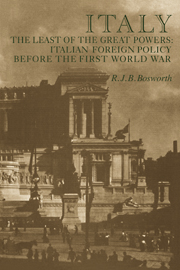Book contents
- Frontmatter
- Contents
- Dedication
- Preface
- List of maps
- 1 Society and politics in Liberal Italy
- 2 New political pressure groups and foreign policy
- 3 The making of a Foreign Minister: Antonino Di San Giuliano
- 4 The Consulta: the bureaucrats of foreign policy
- 5 How Italy went to Libya
- 6 How Italy stayed in Libya
- 7 The politics of alliance: Italy in the Triple Alliance, 1912–1914
- 8 The politics of friendship: Italy, the Triple Entente, and the search for a new Mediterranean agreement, 1911–1914
- 9 ‘Un cliente maleducato’: Italy in the Dodecanese and Ethiopia, 1912–1914
- 10 Preparing to digest some spoils: Italian policy towards Turkey, 1912–1914
- 11 San Giuliano's epilogue. The realities of European war 28 June to 16 October 1914
- Conclusion
- Appendix I The Ten Commandments for Italians abroad
- Appendix II Pro-memoria on our politico-military situation, by A. Pollio
- Appendix III San Giuliano's poem about his funeral ceremony
- Abbreviations used in the notes and bibliography
- Select bibliography
- Notes
- Index
3 - The making of a Foreign Minister: Antonino Di San Giuliano
Published online by Cambridge University Press: 16 November 2009
- Frontmatter
- Contents
- Dedication
- Preface
- List of maps
- 1 Society and politics in Liberal Italy
- 2 New political pressure groups and foreign policy
- 3 The making of a Foreign Minister: Antonino Di San Giuliano
- 4 The Consulta: the bureaucrats of foreign policy
- 5 How Italy went to Libya
- 6 How Italy stayed in Libya
- 7 The politics of alliance: Italy in the Triple Alliance, 1912–1914
- 8 The politics of friendship: Italy, the Triple Entente, and the search for a new Mediterranean agreement, 1911–1914
- 9 ‘Un cliente maleducato’: Italy in the Dodecanese and Ethiopia, 1912–1914
- 10 Preparing to digest some spoils: Italian policy towards Turkey, 1912–1914
- 11 San Giuliano's epilogue. The realities of European war 28 June to 16 October 1914
- Conclusion
- Appendix I The Ten Commandments for Italians abroad
- Appendix II Pro-memoria on our politico-military situation, by A. Pollio
- Appendix III San Giuliano's poem about his funeral ceremony
- Abbreviations used in the notes and bibliography
- Select bibliography
- Notes
- Index
Summary
His efforts in promoting new enthusiasm for the Geographical Society, Lega Navale or Istituto Coloniale scarcely seem enough to win Antonino Paternò Castello Di San Giuliano immortal fame. The fact that he was Italy's Foreign Minister in July 1914 has also granted him little recognition outside Italy. His Christian name is often misspelled; even his term of office is mistaken. The major English textbook on modern Italian history dismisses him as ‘timid and pro-German, the one politician whom the King really appreciated’.
Inside Italy, by contrast, San Giuliano's defenders have outnumbered his critics. One of his more intelligent juniors, Carlo Galli, looking back decades after San Giuliano's death, discerned that ‘after Cavour there certainly has not been any other Minister of Foreign Affairs of a higher ability, of a more ardent spirit and of a further vision’ than San Giuliano. From the senior Italian diplomatic historian of the period San Giuliano has earned the assessment ‘excellent’, in reference both to his ability and training. The Fascist historian, Francesco Salata, even depicted San Giuliano, the seer, prophesying in 1914 that Italy would fight another great war ‘twenty or thirty’ years later.
The motivation of such defenders was rather more patriotic than objective. For example, Galli was already a friend of the Nationalists, before 1914 a patriot and a Fascist-to-be. Augusto Torre has been the epitome of the official writer, having pursued an unbroken pedagogical career from 1913 to the 1970s. San Giuliano's reputation seems to rely on his success. While foreign affairs were under his administration Italy conquered Libya and suffered no international fiascoes.
- Type
- Chapter
- Information
- Italy the Least of the Great PowersItalian Foreign Policy Before the First World War, pp. 68 - 94Publisher: Cambridge University PressPrint publication year: 1979



